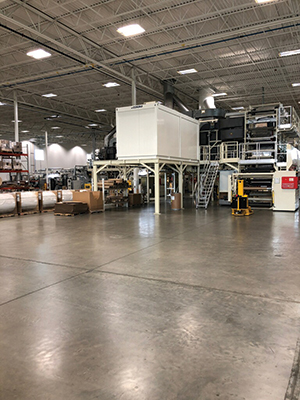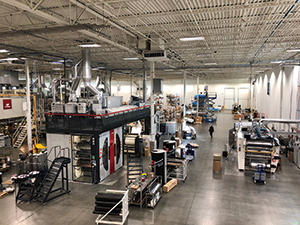 |
|||

|  |

|
|

Südpack USA expands footprint to offer complete cheese packaging solutions
By Alyssa Mitchell
 |
| Photo courtesy of Südpack |
| INVESTING IN INFRASTRUCTURE — Südpack continues to invest in its facilities in Oak Creek, Wisconsin. |
 |
| Photo courtesy of Südpack |
| PRINTING PRESS — Südpack has two plants in Oak Creek, Wisconsin — known as North and South — and recently invested in new printing presses (Flexo) and a laminator in its North plant. |
OAK CREEK, Wis. — Südpack USA, a family-owned U.S. affiliate of German-based Südpack Group, is a provider of flexible packaging solutions with six locations globally. The company is making increased inroads into the North America market as it seeks to provide the cheese industry with complete packaging solutions.
Südpack Group in late 2017 acquired Seville Flexpack Corp., based in Oak Creek, Wisconsin. The acquisition marked the company’s first U.S. production site; previously, the company’s only location in the U.S. market was a sales office in the Chicago area, notes Simon Hermans, director of sales and marketing, Südpack USA.
With the acquisition, Seville Flexpack officially became part of the Südpack Group, which retained all of Seville’s employees and continues to serve its customers.
The Oak Creek facility allows the company to offer its customers local converting, including flexo and roto printing, lamination, slitting, and more, Hermans says. The acquisition enables the company to provide products and solutions for U.S. customers with shorter delivery times and greater flexibility.
“Moreover, by acquiring its first overseas production site, Südpack has laid the groundwork for further expanding its U.S. business,” Hermans says. “That was an essential aspect for us, as we intend to grow further in the United States and broaden our client base.”
He notes Südpack founder Alfred Remmele is a cheesemaker by profession and made inroads into cheese packaging with the development of suitable film solutions for the maturation of different varieties of cheese in the 1960s.
“From there, the company added extrusion and printing technologies to the business,” he says, noting it currently employs 1,300 worldwide.
Hermans notes that for more than 50 years, Südpack has focused on how to improve its film solutions to achieve the best cheese maturation results. For this purpose, the company offers a complete system consisting of tubular bags, bags on a roll or side-gusseted bags, as well as semi-automatic and fully automatic machines aligned to these products. The film solution, which is exactly tailored to the product, ensures optimum maturation of hard and cut cheeses, he adds.
Südpack USA focuses on three main properties in its cheese maturation solutions — variable (defined gas permeability for different types of cheese); product protection (secure sealing); and mechanical strength (high puncture resistance). The result is longer shelf life, even maturation and dimensional stability, including less trimming loss, optimum storage and transport.
“The VSM machines are optimized for the requirements of the cheese sector, and the range from manual to fully automatic packaging lines are adapted to companies’ individual requirements,” Hermans says. “This allows for customers to easily, safely and efficiently pack cheese into a bag and leave it to mature.”
While the company began with a focus on cheese maturing bags, Südpack has been working with its customers on other packaging solutions as well.
“The consumer is at the heart of developing new packaging systems. Packaging systems make everyday consumption easier thanks to effortless opening and resealing. Laser perforations offer additional benefits and enhancement,” Hermans says.
“We have been continuously expanding our range of film solutions for dairy products and today can offer a wide range of rigid and flexible films, resealable films, and pre-made bags to provide maximum freshness at the point of sale,” he adds, noting different types of cheese have different requirements of their packaging.
“That is why we provide customers with detailed advice on which of our films is the optimal solution for their dairy product — so that it stays fresh for a long time and ensures the customer’s full enjoyment of the product,” he says.
The company recently introduced an additional Flexo Print machine that produces fast, high-quality surface prints for effective results, among other investments.
“It is the ideal process to be able to flexibly design medium-sized batches of film in high quality,” Hermans says. “Our company is among the leading suppliers in this sector.”
Hermans notes that in general, Südpack USA has a solution for any packaging style in the United States right now — from a Hayssen-style flow wrap with a zipper to a vacuum package or a cheese stick wrapping.
“We can provide a ‘me, too’ product for anything you see on the retail shelf today, but we also bring innovation to the table,” he says.
Hermans says this is where the company’s experience with German packaging technology provides it with an advantage.
“Everything we do is driven by a sustainability aspect,” he adds.
He notes Südpack looks at how to reduce food waste with recloseable features and a reduction in materials.
“With our packaging, we’re potentially replacing the zipper — which is a lot of material, a lot of plastic — with a very thin layer of resealable film,” he says.
Peal-reseal is the dominant packaging style in Europe for anything that is sliced or shingled, Hermans adds.
“We have nearly 30 years of experience with this type of film that we can bring to the U.S. market,” he says.
Hermans notes the consumer is at the heart of developing new packaging systems.
“We look at convenience, product protection and appearance at the point of sale when focusing on packaging development,” he says.
Südpack USA offers what Hermans refers to as the “multi-peel family.” The product line includes a variety of films for specific applications — from Multipeel High Base sealing film to Multipeel Flow Wrap resealable tubular bags.
Multipeel xPET adds a “sustainable alternative” to the company’s portfolio of resealing films, Hermans adds.
The top film is an evolution of Multipeel but now sealing against mono-APET. Unlike other standard solutions on the market, it ensures completely safe sealing on all kinds of trays and rigid PET films — with a PET-sealant — at a low sealing temperature of 145 degrees Celsius.
He adds that rather than using polyethylene as a traditional sealant, the company is using polyester.
Südpack also recently introduced Smart Peel, which features easy opening and high-opacity white coloring.
The technology is suitable for a variety of shapes including bowls or trays, cups and buckets and applications ranging from cream cheese, yogurt, bakery products, sauces, confectionery or technical products, as well as for large-size restaurant packaging of salads and marinades.
The product features are reflected in the name — Smart stands for Safe, Minimal, All-round, Resistant and Thin.
Two critical strengths of Smart Peel are the peeling and sealing properties, Hermans notes. The film is available in two versions: one for thermal applications such as pre-cooked meals and one for cold products such as fresh cheese or fruit.
Südpack earlier this year also began commercial rollout of its easy-to-recycle Ecocraft Skin packaging, which is aimed at helping cheese products attract attention in the refrigerated and frozen food sections with its paper-like look.
Hermans says the packaging is designed to improve sustainability levels while, significantly, it does not require food manufacturers to invest in new thermoforming machines.
“Secondly, it’s easy to recycle: once the product has been removed, consumers can simply separate the upper and lower skin film from the paper at the bottom and put the individual parts in the appropriate recycling bin,” he says.
Hermans notes the No. 1 advantage of Südpack in the United States is the company’s decades of experience in packaging technologies from Europe with a local presence in the U.S. market in the heart of America’s Dairyland.
Looking ahead, Südpack wants to continue to be “disruptive” on the retail shelf with new offerings and innovation while continuing to offer its customers superior quality and flexibility.
“We’re one of the few companies in the world that have our own packaging equipment. We’re extremely flexible when it comes to lead times,” Hermans says. “We also can do testing in-house before sending products to a customer.”
Food safety also is top of mind in Südpack’s packaging solutions, and the company strives to provide solutions that overcome any risks, Hermans says.
“It starts with us — our facilities have top food safety certifications. We have an extremely high requirement for hygiene and safety for materials handling — we take this extremely seriously,” he says.
Hermans adds future development likely will focus on increased sustainability.
“Here in the U.S., we will be growing with our customers,” he says. “With our U.S. presence, our customers are excited to work with our family-owned company with roots in cheesemaking.”
CMN
| CMN article search |
|
|
© 2025 Cheese Market News • Quarne Publishing, LLC • Legal Information • Online Privacy Policy • Terms and Conditions
Cheese Market News • Business/Advertising Office: P.O. Box 628254 • Middleton, WI 53562 • 608/831-6002
Cheese Market News • Editorial Office: 5315 Wall Street, Suite 100 • Madison, WI 53718 • 608/288-9090